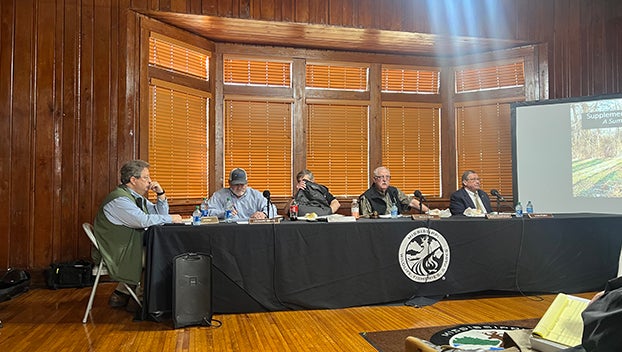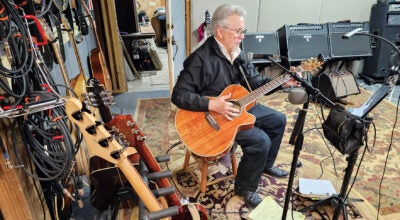Commissioner Leonard Bentz seeks CWD answers
Published 4:58 pm Thursday, March 21, 2024

- MDWFP commissioner Leonard Bentz is second from left. He had a few questions regarding Chronic Wasting Disease at the conclusion of the educational session Thursday. (Hunter Cloud | The Daily Leader)
MCCOMB — Mississippi Department of Wildlife, Fisheries and Parks commissioner Leonard Bentz asked a handful of questions following Thursday’s educational session on supplemental feeding. The session was held at Percy Quin State Park ahead of a regularly scheduled business meeting for the commission.
Bentz asked if researchers have tested for CWD prions on scrapes and licking branches in Mississippi CWD zones in addition to feeders. The Daily Leader reported on MSU’s research project which looked at detectability of CWD prions in scrapes and licking branches in Benton and Marshall Counties which is in the CWD zone last May.
Wildlife Chief of Staff Russ Walsh answered the question by explaining the environmental sampling was done in Mississippi’s north CWD zone. The project is developing science which can serve as a canary in the coal mine like it did in Claiborne County.
Bentz asked if any cases of CWD have been reported to be passed from a cervid to a human. Walsh said there are no documented cases of CWD being passed to a human yet. The Center for Disease Control does recommend hunters test deer meat for CWD prior to eating due to the risk of zoonotic spread. CWD is a prion disease in the same family of transmissible spongiform encephalopathies diseases like Mad Cow disease.
“I think it is important that we educate the public the best we can but if we don’t have definitive information on health issues I think it is irresponsible to put that notion in the public’s mind to say it is possible CWD could spread to humans,” Bentz said. “It is irresponsible of us.”
Walsh replied by saying “If I can, we couched this discussion as a risk. We are not saying you will get a disease but there is risk.”
Bentz replied by saying “Citizens hear CWD and humans and they won’t deer hunt anymore. That equates to less people buying licenses.”
Last year, commissioners voted to change the CWD supplemental management plan on June 22, 2023. The very meeting that MDWFP Deer Program Coordinator William McKinley shared notes with key takeaways from the CWD symposium with commissioners. One of the takeaways handed in abbreviated notes by MDWFP staff acquired by public information request focused on the potential of CWD to spread to humans and processed meats. Bentz was present at that meeting.
The Mississippi Department of Health and the World Health Organization additionally recognize the risk of CWD spread to humans and have guidelines for what hunters should know. MSDH’s initial post following the first CWD detection in Mississippi is no longer active to educate hunters about risks and safety steps.
Bentz reiterated his point about sharing the information after thanking the department staff for the work they do.
“I wish our department would do a better job of not using tactics that could possibly go to a human. All they hear is disease, human. End of story.”
Hopeful thinking
Bentz asked about studies regarding humic acid which denatures CWD prions. Walsh said some preliminary research shows it does degrade CWD prions but if that makes them not infectious or not present there is more research needed.
Public education was the frame used again by Bentz as he asked Walsh if they could treat the soil with humic acid to break down CWD prions in the environment. Bentz suggested that all funding sources should be thrown to look at the possibility of using humic acid to decontaminate the environment of CWD prions.
“You would think if we know one thing that denatures it or slows it down that all funding sources and everything under the sun would be thrown at humic acid to say we might be onto something here,” Bentz said. “You don’t ever hear that. We really need to be throwing our research at. Hey there is something there. I do speak for biologists from time to time.”
McKinley said research shows humic acid does denature prions and is one of the hopeful parts of CWD research. He said preliminary research is finding CWD prions are denatured by humic acid in soils. Prescribed fire may also cause prions to bind with clay particles to not be readily available on the landscape.
“That is hope but it is still not treating the source. Deer are the living source walking around spreading it. We can’t just treat the soil and expect it to go away when deer are continually putting it back out,” McKinley said.
Bentz poked fun at himself as the “non-scientific commissioner,” a nickname given to him by SuperTalk Outdoors radio show host Ricky Mathews. He said the commission should have had these discussions that something is going on out there and not just that supplemental feeders can stop the disease.
“Not once have we had a discussion about humic acid and educating the public about there being something there,” Bentz said. “We are always on the doom and gloom. It is a tough disease, make no mistake about that. But at the same time, We need to educate the public about some of the positive things that are going on with CWD.”
One of the notes in the CWD symposium handout speaks to the use of bleach to decontaminate CWD prion positive surfaces. Again, those handouts were given to commissioners last June. The Daily Leader additionally shared positive news about how the stomach of bobcats could be a tool in fighting CWD. McKinley told the commission he would check on the Humic acid research.
Commissioner William Mounger asked McKinley about an update on live CWD tests. McKinley said Texas is currently using a live test to screen for CWD in captive facilities and they hope the test will be approved by the United States Department of Agriculture.
Bentz asked if the commission could send a resolution to the CWD prion institute to test humic acid applications to feeders. Mounger replied that they could fund a study at Mississippi State University. Bentz said he believes the research on humic acid should have been jumped on with two feet in the CWD world but does not fault the wildlife staff.
Check back tomorrow for more public comments from the MDWFP commission meeting.





